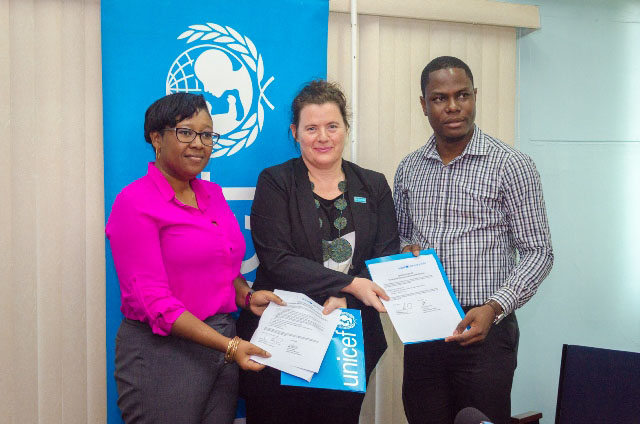Italian Special Envoy for the Caribbean, Caterina Bertolini, visited Bartica yesterday to assess the scope of work which was undertaken under the first phase of the Transitioning to National Energy Security (TNES): Bartica as a model ‘Green’ Town Project.
According to a Ministry of the Presidency release, Phase One of the US$650,000 project was facilitated by a grant from the Government of Italy. It commenced in June 2018 and lasted approximately 6 months having completed all of the energy audits and public awareness exercises along with the establishment of an energy data management centre. The data gathered will be used to inform evidence-based decision-making for the future implementation of projects and programmes.
Bertolini visited the Three Miles Secondary School – where the financing has supported Science, Technology, Engineering and Mathematics (STEM) Leagues and the set-up of a Solar Photovoltaic System – the Four and Five Miles Communities, which have benefited from LED street lighting and the Mayor and Town Council offices, where the repository for all of the studies and surveys that have been conducted, has been set up.
The Italian Envoy, who was accompanied by Juanita Thomas, Project Assistant at Office of Climate Change, expressed her pleasure at seeing what has been taking place in the town through the support from her Government, the release said.
Mayor of Bartica, Gifford Marshall said that the residents welcomed the visit by the Special Envoy and the support that has been given to the township in its vision of a ‘green’ town.
“It has been a step in the right direction. We have had household surveys, audits of the transportation sector, surveys and so forth and all of this information is now stored here at the municipality and it will guide us on our projects. We are already seeing the fruits of it. We are so
grateful for the partnership between the Office of Climate Change and the donor agencies,” the Mayor was quoted as saying.
Various agencies in and out of Guyana were contracted to conduct work in five main areas: the Household Socio-Economic and Energy Use Baseline Survey; Audit of Public Facilities; Institutions and Street Lighting; Energy Audit of Transport Sector; Production of Content Manual and Implemen-tation of Public Awareness and Education Campaigns; and Development of the Bartica website. In addition to the data gathered, emerging out of Phase one, a website, bartica.gov.gy, has been established with the sole purpose of providing information on the town and its development.
As part of the TNES Project, the Office of Climate Change handed over two STEM kits to the Bartica and Three Miles Secondary schools in an effort to equip them with technological skills, which can assist in finding solutions to assist Bartica’s transition into the first model ‘green’ town in Guyana and the Caribbean.
More than 90 students have been trained in STEM and Robotics at the Three Miles Secondary School and the approximately 65 students who live in the dormitory are benefitting from reliable electricity supply through the Solar PV system.
The school’s House Master, Ricardo Allen said that the installation has made life significantly more comfortable for both the teachers and students since in the past, they have been plagued with frequent blackouts and food spoilage.
“This has really improved our lives. This is a really good initiative the Governments have taken on to improve our lives. When we have blackout, the children do not react in a nice way; they run and scream and so on and so this is the best thing they could have done here for the students. They are in a better frame of mind and it is helping the students in a good way,” he said.
With regard to the LED lighting project, Marshall said that approximately 97 per cent of the township is now outfitted with over 800 street lights with over 5000 residents benefitting directly.
Desmond Stoby, a resident of Four Miles, which has benefitted from LED street lights, said that the residents of that community are now feeling safer and more secure with the installation of the lights, especially since they represent ‘green’ alternatives.
“We are really enjoying the street lights we have. I personally and most of the residents welcome those street lights. It used to be so dark and people used to be afraid to walk, but not anymore. It is really something good and I really appreciate it. I want to join with the residents to applaud this initiative. I love it and the residents love it,” he said.
The Government of Italy through the Caribbean Community Climate Change Centre (Five C’s) has already approved some US$3.67 million for some of the recommendations coming out of the studies and audits to be implemented in Phase Two, particularly in the areas of capacity building, efficient lighting and feasibility studies for electric vehicles, the release added.









